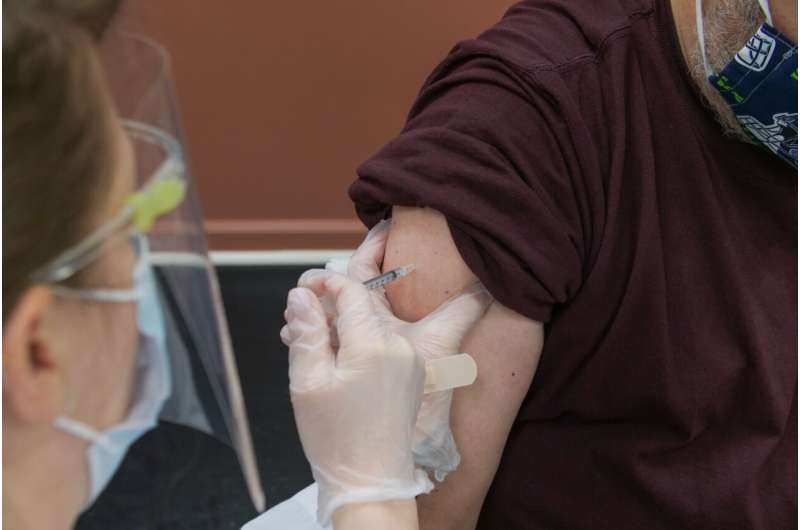Public torn over COVID-19 booster jabs and flu vaccinations

New research by a Swansea University expert has highlighted how torn members of the public are over the issue of COVID-19 booster vaccines and the flu vaccine.
The study by Dr. Simon Williams revealed how people’s attitudes to COVID-19 boosters corresponds with their attitudes to initial COVID-19 vaccines—with those who were hesitant towards initial COVID-19 vaccines also uncertain about the idea of boosters. Those keen to accept their initial vaccines tended to see boosters as an extension of their previous vaccines.
It has just been published on PsyArXiv, a site used by researchers to share new findings on timely issues before they have been peer-reviewed for publication in a journal.
The main findings of the study were:
- Booster intentions correspond with decisions around initial vaccination.
- There are mixed views on the idea of booster vaccines and flu vaccines. Some people are worried that taking booster and flu jabs together might interact to have unpleasant side effects.
- Messaging around booster vaccines needs to take into consideration that some are still hesitant around COVID-19 vaccines. There needs to be an emphasis on booster jabs as a way to maintain immunity over time and a collective act to protect others and retain normality.
- Messaging around boosters and influenza vaccines need to stress they are safe and convenient to be taken together and that both are important, especially for those clinically vulnerable.
The study is the latest report from the Swansea University Public Views of the COVID-19 Pandemic project. The research has involved online focus groups and interviews with people from across the UK, exploring their views and experiences on a range of topics related to the pandemic, including COVID-19 vaccinations.
Dr. Williams, Senior Lecturer in People & Organisations, said: “Messaging around COVID-19 boosters might tap into the fact that those who have already had their COVID-19 vaccines see a booster as a way to simply extend their immunity. Because the vast majority of adults, especially older adults and those in vulnerable groups, have had their initial vaccinations, I would expect most people to accept their booster jabs if and when offered.
“Although there was initially some hesitancy for many when COVID-19 vaccines were first being developed, booster jabs are likely to be seen by most as less ‘new’ and therefore less risky in terms of potential side effects. However, those who remain hesitant about their initial vaccine decision tend to be less favorable towards the idea of booster jabs.
“Another key message is around seeing boosters as a way to protect the freedoms we are currently enjoying and to avoid future restrictions. In this way, boosters can be seen as a collective act that can help to protect normality.
“One concern is over potential uptake of the flu vaccine this coming winter. In this study, some people were concerned over the possibility of an interaction between a COVID-19 booster jab and a flu jab if taken at the same time. It is important that health authorities communicate clearly to people in the relevant categories, not only how it is safe to take both at the same time, but also their importance in protecting themselves and others in the coming months.”
Source: Read Full Article
